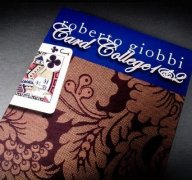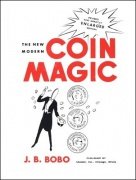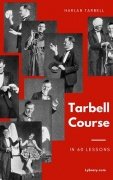Created: 01/01/2020
Updated: 08/01/2025
What are the best magic books for beginners?
This is actually a very hard question to answer because there are all kinds of beginners with all kinds of backgrounds and interests. I will limit myself to the performance of close-up where I gathered my own experience doing magic, and there I will focus on magic with cards, coins, and mentalism. If you want to take a shortcut and not read through the rest of my opinion here are the three best classics which are wonderful and affordable:
- The Royal Road to Card Magic by Jean Hugard and Fred Braue
- The Modern Coin Magic by J.B. Bobo
- Practical Mental Effects by Ted Annemann
CARD MAGIC

If I would have to suggest one book or one series of books I would pick Roberto Giobbi's Card College, which comes in five volumes. This is a modern classic that will guide you from the first time you hold a pack of cards in your hands to the heights of card magic. It teaches you much more than sleights and tricks. It covers a lot of theory, misdirection, audience management, routining - all the things which make a trick a miracle, or a guy doing magic a performer and entertainer. Most likely you wouldn't need all the moves explained in Card College and you can find other great routines in other great books. But having everything compact in one place, written and explained thoroughly and consistently by one professional, makes a difference. I use Card College as my desk reference. Whenever I need to look up the mechanics of a move, or whenever I feel like brushing up on my pass, I read it. Roberto goes into lots of details when it comes to teaching. He tells you all kinds of little tips, hints and checkpoints to master a technique. And the effects he teaches together with each technique are fantastic. Some are classics others are gems you will treasure for the rest of your life.
Sure, all five volumes is an investment of about $170, not particularly cheap. My suggestion, if money is an issue, is to buy only volume 1. Study it, absorb it and when you think there is nothing left to learn, buy volume 2, a.s.o. A word to paper versus electronic version. The electronic version has one big advantage for beginners - the video clips. Being able to see how Roberto, an accomplished master of the pasteboards, performs each move is invaluable. Also you will find out some years down the road in your pursuit of magic, that an electronic research library is a sweet thing to have. If you stay long enough with magic, you will inevitably accumulate a sizeable library. You will forget where you have read things. Then you will wish you could search. Ebooks allow you to search easily and efficiently. That is not to say that the paper version isn't excellent. It is up to you to decide if you rather stick to paper or start building your e-library.
 If for whatever reason you just cannot learn from a book or ebook then Giobbi has released a good part of the contents of the first two volumes of his series as a video course: Card College Personal Instruction. It is perhaps the most accessible way to learn from Giobbi. No reading, just watching and learning directly from his demonstrations. But be aware that not everything that is covered in the books and ebooks is in this video course.
If for whatever reason you just cannot learn from a book or ebook then Giobbi has released a good part of the contents of the first two volumes of his series as a video course: Card College Personal Instruction. It is perhaps the most accessible way to learn from Giobbi. No reading, just watching and learning directly from his demonstrations. But be aware that not everything that is covered in the books and ebooks is in this video course.
If Roberto's first volume is still too expensive for you, or you are scared by the word 'College' - might remind you of some unpleasant times - you could consider the following books: The Royal Road to Card Magic by Jean Hugard and Fred Braue is an all-time favorite and excellent book. It is available very cheaply as a paperback or from Lybrary.com as an ebook. Before Card College this was the recommended book for card apprentices. The Magic Book by Harry Lorayne covers fewer sleights and approaches the teaching from a different angle. It is very well written and highly readable. It focuses more on the routines themselves and describes moves along the way. For more advanced card work I suggest you read Expert Card Technique by Jean Hugard and Fred Braue and Card Control by Arthur Buckley. These are more move-heavy books. They still cover some excellent routines, but their main value is derived from various techniques. Card magic is such a vast field that you will find lots of material to study from. But keep in mind that there is also a lot of garbage out there. You can never go wrong with books by and about the following folks: Dai Vernon, Ed Marlo, Jon Racherbaumer, Simon Aronson, Ken Krenzel, Gene Maze, Allan Ackerman, Paul LePaul, ... Check out online forums, ask people you admire and visit conventions to develop an understanding of what is valuable and what is not. You can also find further reading suggestions in the article Jason England's 17 Card Books to Study. You can always send me an email, too.
If you like to learn gambling-type routines then read The Expert at the Card Table by Erdnase or books by Darwin Ortiz. For some Erdnase is the best book ever written on cards. Dai Vernon, the professor, thought so and some of the greatest performers thought so, too. It is definitely a great book and given the fact that it was written more than a hundred years ago and still arouses so much attention and annotations proves its value. But it is not an easy book and probably in general not a good book to start with. If you are a card nut, and you are determined don't let anybody tell you where to start. Erdnase is a must-read. It is up to you to decide when to read it in your career. Just make sure you do read it thoroughly. (Did you know that there is a century-old mystery around who the real author of The Expert at the Card Table was? If you are interested in these types of historical questions you may enjoy reading The Cardsharp and His Book.)
Besides learning a lot of moves you should seriously study mathematical principles, ruses, and subtleties that allow one to perform so-called self-working card tricks. With these tricks, you can focus on the presentation, timing, and spectator management, because you do not need to worry about difficult moves and sleights. My personal favorite here is Card College Light by Roberto Giobbi. But it is closely followed by Scarne on Card Tricks by John Scarne and anything by Rufus Steele.
Studying is a lifelong process. Eventually, you will have to pick out what is most interesting to you from a long list of available material. A very good start to see the breadth and depth available is to browse the Cards subtopic.
COIN MAGIC

Bobo's New Modern Coin Magic is the classic book you should have. Even if you do not work through all sleights and routines it is an indispensable reference book any serious coin worker should own. David Roth has written another excellent book on coins - Expert Coin Magic. It is particularly strong in coinbox routines, where the next one is completely void of. Coinmagic by Kaufman is geared more towards the intermediate and advanced level but has to be mentioned as one of the coin books you should own eventually. He structures his book in chapters dedicated to a particular performer, David Roth, Dai Vernon, Slydini, Derek Dingle and Kaufman himself. The Roth and Kaufman books are quite expensive. Bobo's is available as ebook, paperback, and revised hardback. If you are looking for a smaller less intimidating introduction to coins look into Introduction to Coin Magic by Shigeo Futagawa or Coin Magic by Jean Hugard. Before I close the coin section you should also seriously consider Principles and Deceptions by Arthur Buckley. It has an excellent section on coins, as well as cards, billiard balls and theory. For much more coin routines and tricks see our Coins subtopic.
MENTALISM

Probably the overall best resource for mentalism is the Jinx magazine. It is available second-hand, reprinted in bound volumes and digitally. A good part of Jinx's contents can be found in the Annemann books Annemann's Card Magic and Annemann's Practical Mental Effects. However, Jinx is not a structured teaching tool. It is more a resource pool in which you can dive any time you like and pull out some nuggets. The bible of mental magic is Corinda's Thirteen Steps to Mentalism. A much more recent must-read for any mentalist is Fundamentals by Bob Cassidy. (Check out Bob Cassidy's free The Thirty-Nine Steps to Mentalism, a wonderful reading list with explanations why each book listed is on the list.) Gems of Mental Magic by John Brown Cook and Arthur Buckley is a highly underrated book. Among many other wonderful routines, you can find the explanation to David Copperfield's Graffity trick. Of course, the trick is not called 'Graffity' but the method and structure of the effect are identical to the one Copperfield popularized. A modern classic is Larry Becker’s Stunners! which is loaded with lots and lots of great routines. Another tome is T. A. Water's Mind, Myth, and Magick. Modern and psychological-based methods can be found in works by Derren Brown and Steve Banacheck. Other Authors you should be checking out are Max Maven, Bob Cassidy, Eugene Burger, Tony Binarelli, Richard Busch, Ted Lesley, Kenton Knepper, Al Mann, Leo Boudreau, Luke Jermay ... Mentalism subtopic.
THEORY
Many good books have significant portions dedicated to theory. Actually, it is one indication that a book is a good book if it also covers theoretical aspects. For example Card College vol 2 has a long theoretical section. The Tarbell Course has a lot of important information besides moves and effects. Pocket Power has a wonderful chapter on misdirection. Books that are mainly dedicated to theory are Our Magic by Nevil Maskelyne and David Devant (actually anything by David Devant is highly recommended, for example his Lessons in Conjuring), Strong Magic by Darwin Ortiz, Magic and Showmanship by Henning Nelms, The Books of Wonder by Tommy Wonder, and Eugene Burger's books are also great resources for this kind of information. You might also find John Carney's Recommended Reading List enlightening or go directly to the Theory subtopic.
GENERAL REFERENCES

If you are looking for books that cover a wide range of magic then you should definitely own the Tarbell Course. Although it was written in the late 1920s, it is still a reference every good magician uses. If you read Tarbell from the beginning to the end you will know more about magic than the average magician. You will never need or use everything, but a knowledgeable magician should know these methods and principles. I think a card magician should also know something about big stage illusions and vice versa. Tarbell teaches you everything from balls to ropes to silks to mentalism to thimbles, cards, coins, and big illusions - and much more. A smaller but equally excellent introduction to magic is Henry Hay’s The Amateur Magician’s Handbook. I would venture to say that at least a third of the living population of magicians got their start through this book. It was written with a genuine love for magic. If you prefer a British author then The Big Book of Magic by Patrick Page is a fantastic choice. There are also a number of excellent beginners books which you can get from your local or online book store: Now You See It, Now You Don't by Bill Tarr, Self-Working Series by Karl Fulves, Magic For Dummies by David Pogue, The Complete Idiot's Guide to Magic Tricks by Tom Odgen and Mark Wilson's Cyclopedia of Magic or Complete Course in Magic by Mark Wilson.